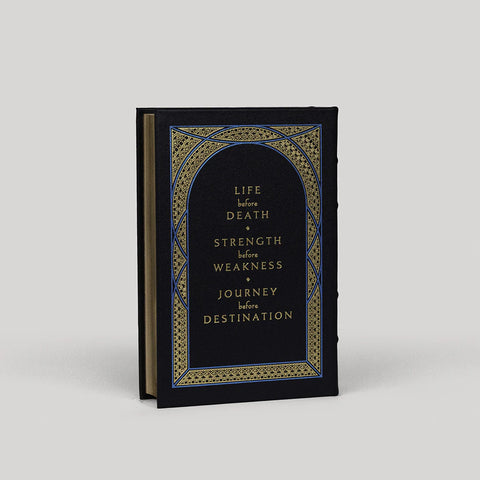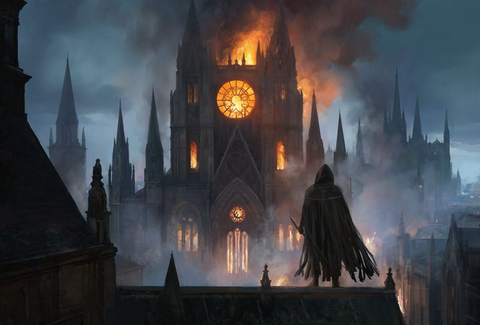Hey all, Tayan here! Welcome back to The Cognitive Realm. Today, we have an exciting post to share with you. Dragonsteel’s Lynn Buchanan is joining us to discuss her debut novel (The Dollmakers is out now!) and her journey from aspiring writer to professional novelist. If you hope to make art your profession regardless of medium, this post is for you.
Lynn is an incredibly dedicated and talented author who will join us on this blog more often! So, check in periodically for feature pieces like this one.
Without further ado, I’ll turn things over to Lynn to share her advice on how to write like a professional before you are one.
Who is Lynn Buchanan?

I’m Lynn Buchanan, and I write fantasy novels for adults that toe the line between whimsy and horror. By day I work as an Art Assistant at Dragonsteel, and by earlier-in-the-day I’m a novelist, writing stories about creepy dolls that fight scary monsters, mummified arms used as dancing props, and moody painters grappling with quite literal demons.
My debut fantasy novel, The Dollmakers: A Novel from the Fallen Peaks, was published by Harper Voyager in August 2024. When I’m not writing or working with artists over at Dragonsteel, I like (sporadically) playing the oboe, collecting an obscene number of house plants, and re-watching Studio Ghibli movies until my eyes bleed.

What is The Dollmakers?
The Dollmakers: A Novel from the Fallen Peaks is my debut novel. It’s an adult fantasy, good for fans of Studio Ghibli films and books in the vein of The Emperor’s Soul, Nettle & Bone, and The Goblin Emperor. It’s the first book in the Fallen Peaks series, a sequence of standalone novels set in the same world featuring stories that span across different countries and time periods, all featuring the same magic system in increasingly unhinged ways (i.e., in one story we have living dolls, in another we have mummified arms used as dancing props, and, yes, that’s the same magic system).
The Dollmakers specifically features creepy dolls that fight scary monsters, and the women who make those dolls. For a more detailed blurb of the story, see below:

Treating Writing as a Profession: 3 Steps to Write Like a Pro Before You Are One
When I was in the third grade, two things happened—I learned how to write dialogue tags, and I decided I wanted to be a novelist. These phenomena were related; I’ve no idea what strange, obscure switch went off in my nine-year-old brain, but the moment I was taught how to properly wield quotation marks I felt invincible, at long last in possession of the mythic secrets held by the idolized authors who penned my favorite books. Thus equipped, I decided it was time for me to start writing my own stories, tales that were sure to rattle the very stars from the heavens, words that would one day sit crowned as the best flippin’ things ever written in all time.
Seven books and sixteen short years later, I sold my debut novel, The Dollmakers: A Novel from the Fallen Peaks, to Harper Voyager. And I’m ninety-nine percent sure all the dialogue written in it is correctly tagged.
The Dollmakers came out this week, and its release has me feeling an interesting mix of nostalgia and contemplation—a combination that’s made me look back over those sixteen years I spent writing bad books and less bad books and books bordering on decent in search of what, exactly, helped me get to this point in my writing and career.
The answer is a lot of things. The less maddeningly-vague answer is, in short, pretending to be a professional writer even when I wasn’t.

Art by Deandra Scicluna
After pawing through a truckload of memories and doing my darnedest to be pithy and succinct (here’s to you, college professor who gave me a D for writing a two-page paper when you asked for a one-page paper, may your pettiness live on in infamy), I’ve boiled down how I accomplished that farce to three choices:
- Prioritizing
- Disproving the myth of inspiration
- Learning to enjoy the work (and on days you can’t, writing anyway)
#1: Prioritizing
Now, I’ve always been a writer. Ever since the third grade and its enlightening dialogue tags I’ve written, and if one writes, one is a writer. But my goals have always tended toward monetizing in some way—I wanted to be a professional author with a paycheck and my books in bookstores and a big publisher backing me up that could help my stories reach the widest audience possible. For the longest time, though, I wasn’t sure what to do to make that happen. Outside of writing, of course. Which I did, on and off and less than consistently throughout my childhood and teenage years.
It wasn’t until I was in college and had the chance to take Brandon’s writing class that I stumbled upon an idea that led to me making my second big professional decision, just eleven short years after dialogue tags led me to make my first—after hearing Brandon describe his writing schedule and work ethic, I decided to emulate him, and treat my writing like a job.
A simple idea, sure. But easier said than done—it’s devilishly hard to get oneself to treat something like a job when said something isn’t producing any dividends, after all. No paycheck. No internship-esque work experience. Just you dragging yourself to your laptop at unholy hours and pretending with all your might that your writing is an investment that will pay off someday.
For me, that meant getting up early every morning (sometimes as early as 5:30am, a memory that now makes me shudder and stagger off to take a retroactive nap) and writing until I wrote 2k words before going off to school or the job I had that kept me in groceries.
At first, I tried writing every day, but I quickly learned that burnout is not a myth, and I was going to do more harm than good for my writing if I pushed myself too hard; instead of every day, then, I settled on five days a week, taking the weekends off just like I would with a traditional job. A schedule I’ve maintained for seven years, now.
It’s hard to express the wonders that has done for my writing. With the mindset of prioritizing my writing time as fiercely as I would a paying job (not allowing anything to encroach on it, not letting anything take precedent over it with the exceptions of emergencies or unavoidable scheduling conflicts, and putting in the required hours every weekday), in three years I wrote seven novels, signing with a literary agent with my sixth book. I wrote two more books while book number six was out on submission to editors, and ended up selling my seventh book (The Dollmakers) to Harper Voyager.
Turns out, when you put a consistent amount of time into an art, you produce more of that art, and, in the process, inevitably improve at said art—shocking, I know.
There were definitely other factors at play (classes and workshops, etc.) when it came to how my writing developed, but that initial choice to treat writing like a job was one of my first steps toward selling a book.
#2: Disproving the Myth of Inspiration
Once I had my “writing as a job” schedule in place, I ran into several difficulties, chief amongst them a great fallacy I’d been functioning under up until that point: that you need inspiration to write.
To be clear, I’m not contesting that inspiration is real. Inspiration definitely exists—not only does it exist, but it’s a big part of my writing process. It’s the initial spark, the clash of ideas coming together and melding into something semi-cohesive, the little detail that grabs my attention while I’m walking down the street, the thought that finds a foothold in my mind and forces me to ponder it over and over until a narrative takes shape. I’ve written entire stories in a single sitting on the fuel of inspiration alone—short stories, that is. Not novels.
Never novels. And that’s where the “myth” part of inspiration comes into things; one of the greatest lies I’ve heard (and, for a long time, believed) about art is that an artist can’t create unless they are continually, endlessly consumed by inspiration, every word they pen enlightened, every scene sent from the heavens above and pristine on arrival. A perfectionist’s nightmare, such is the great stereotype media has built up around art and art creation, an idealized fairytale that makes writers out to be some sort of fabled creature, rather than ordinary people trying to create something beautiful and meaningful, and struggling as they do so.
It took a long time for me to divest myself of the allure of inspiration, to stop beating myself up over having stories that didn’t pop out as perfect as Athena popped out of Zeus’s head—once I shook that stereotype off like the dingy cobweb it is, though, I realized something:
By the large, art isn’t something human beings are naturally motivated to do. Not in the way we’re motivated to eat and sleep, anyway. It’s not an instinct or an inherent requirement of life, and, as such, it can be difficult to find the motivation to put in the work that’s required to successfully craft a story, even when you desperately want to. Hence (in my humble opinion) the connotation of inspiration, the belief that art can only be created in a rush of manic passion.
What I learned upon chaining myself to my desk every morning is that art is something you can decide to do. A choice you make even when you brain feels empty, inspiration elusive as a pot of gold at the end of a fading rainbow. Even if you don’t decide to treat it like a job, narrative writing is work—you have to think deeply and long to make stories function, to make plots and characters click, and you won’t get most things right the first time around. So you rewrite. And adjust. And try again, over and over, to the point that the initial inspiration for your story is buried beneath layers of new ideas and logic and carefully formed plots. Still important, but as a foundation, not the end-all-be-all of the narrative itself.
Learning the true nature (and limitations) of inspiration has helped me curb my perfectionist tendencies, changing writing from a strictly mystical experience to a process, one that stretches across many hours and days and months, with highs and lows baked into its duration that are not only natural, but a key part of making art. Inspiration is important as a starting point, but it isn’t sustainable across an entire book—it gets you to the desk, gets the document open, and might give you the first few pages of a first draft. But it won’t last much further past that.
#3: Learning to Enjoy the Work (and on Days You Can’t, Writing Anyway)
Which leads me to my final point, the last principle that helped me treat writing as a profession before it was one—learning to enjoy the work of writing, and, on days when you simply can’t enjoy the work, writing anyways.
Writing is hard. If I haven’t made that point clear yet, let me make it crystalline here: writing is hard. There are days when the words flow without effort, where character arcs and plot points align like lovers, and everything I write feels flawless and perfect. But, more often, sitting down to write is sitting down to struggle along, fumbling for the right word, the right character action, the right scene to impact the plot in the right away. And then there are days when I like having written, and have no desire to sit down and write anything more. For as many days as I enjoy the writing process itself, there are days that I loathe every part of it. And through all that I write, regardless of my motivation or lack thereof.
Does that mean that, some days, what I write is utter garbage, fit only to be promptly deleted the next day? Yup. And does that mean that, some days, what I write is spot-on, destined to survive through the process of revision and end up in the final product? Yup. And do those spot-on writing sessions come only when I feel like writing? Absolutely not. In fact, I’d bet good money that the majority of my books were written on days I didn’t feel like writing at all.
Which brings me to my point—you have to learn to enjoy (or at least appreciate) the process, because writing is the process. The bad days and good days, the drafting and the revising, even the copy edits that get so granular, you start having mild panic attacks over your keyboard over word choice and punctuation and whether or not you’ve used too many em dashes in this particular paragraph. Bask in the pleasantness that is having a day you genuinely enjoy writing, and learn to push and work through the days you don’t—above all else, learn to choose to write, regardless of your mood, and remember why you do it: to tell stories that mean something, to you and to others. To bring some light into the world, some connection and understanding and maybe even hope.
Allow me to end this idea with a potentially tortured metaphor—writing is a bit like building a house. A step-by-step process, chaotic at times and time-consuming, but built from the same stuff most other houses are built from: hard work, dedication, and patience. You can’t wait to feel like building a house to build one, nor can you get tired of building it, stop half way, and still expect to live in it. If you can come to think of novels the way you think of houses, you may find it easier to put the time and effort in required to make one.
Conclusion
One of the more charming (or is it infuriating?) aspects of writing is that just when you think you have the process down, right when you feel like you “know” how to write novels, you start writing a new book and realize you can’t write it like you did any of your others.
Once you get past the initial horror and frustration of that revelation, you may realize (as I did) that that is why you like writing. The reason you chose stories in the first place—the thrill of the unknown, the immense satisfaction of puzzling out a story to make it the best it can be in the hopes that it can reach and impact as many readers as possible. End goals are nice and all, and it certainly is satisfying to have a finished book in your hands, but it’s the steps that get you there that are the real pleasure and value of writing.
You know, journey before destination. Or something like that.



 https://www.lynnbwrites.com/
https://www.lynnbwrites.com/


Comments (0)
There are no comments for this article. Be the first one to leave a message!